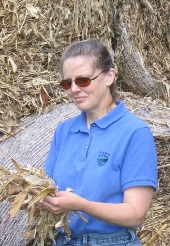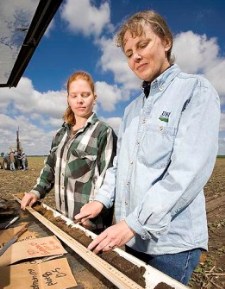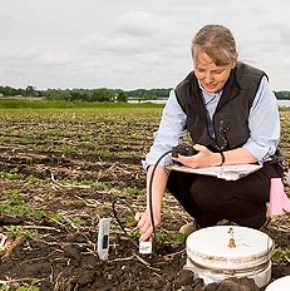


‘A long and winding road’
I am currently a Research Soil Scientist with the USDA-ARS.
Jane Johnson
Research Soil Scientist
USDA-Agricultural Research Service, North Central Soil Conservation Research Laboratory
Government
I consider myself a: Soil Scientist
My Highest Degree: Doctorate
I received my degrees from: University of Minnesota, St. Paul
I received my degree(s) in: PhD - Plant Biology
Length of Career: I have been working as soil scientist for 11 plus years.
What was your career path to your current position?
From time to time, questions like what jobs have you had is used as an ice-breaker. It usually takes me awhile to list the assortment of jobs I have held on my road to my current career position as a GS-14, Research Soil Scientist with the USDA-ARS. For starters, I got off on a bit of rough start as an undergraduate and dropped out college for about a year, worked in a factory and as receptionist. Although, my parents were not happy with me about my decision, it provided me time to mature and gain direction. My attitude and academic performance was dramatically improved as I quickly completed my degree in Biology. My first post-Bachelor’s degree job was at the USDA-ARS-North Central Soil Conservation Research Laboratory. After about four-years I was restless and seized the opportunity to go back to school – this time earning a MS in soil science. After a short detour, when I worked as a laboratory manager, I earned a doctoral degree in Plant Biology. I spent a year doing post-doctoral work, prior to accepting a tenure-track, teaching position. I taught general biology and plant physiology for four-years, when opportunity knocked and I had chance to take a position only 20 minutes from my child-hood home. Although, I enjoyed working and interacting with students; I took the research position – back once more at the USDA-ARS-North Central Soil Conservation Research Laboratory. I was back where I started, but this time as the researcher instead of support help.
What projects are you working on now? What interesting projects have you worked on/led in the past?
Currently, my research is in several inter-related areas concerning carbon sequestration, trace gas emissions, carbon and nitrogen cycling, role of biomass for energy and impacts on soil quality and productivity. I am involved in two USDA-ARS multi-location projects: 1) Renewable energy assessment program (REAP) and 2) Greenhouse gas Reduction through Agricultural Carbon Enhancement network (GRACE.net). A goal of REAP is to establish biomass harvest guidelines, which will protect the soil resource. Such that the soil resource can meet the expanding demands for food, feed, fiber, and energy production, and provide environmental services. The goal of GRACE.net is to enhance the understanding of how agricultural management can reduce its contribution to greenhouse gas emission and sequester (store) carbon in the soil. These are large projects with scientist located across at multiple locations doing coordinated research to solve complex problems.
What do you find most interesting about your work (either currently or a story of a past experience)?
While I enjoy designing, conducting and analyzing experiments interacting with scientists across the country to integrate our collective efforts to solve large multi-faceted, national and global problems is fulfilling. Although I spend many hours working on my computer, I enjoy going to the field with my support staff to collect plant, soil and gas samples.
What do you like best about your job and/or what do you like best about being in your profession?
My profession is challenging, there always new problems to solve. I have an opportunity to make a difference to have an impact. I work for an agency, for which the over-arching mission it to solve problems. It is not enough to recognize there are serious problems facing society, it is critical to seek real, deployable, real-work solutions.
What’s the one thing you would change about your job/profession that would make it better?
These are challenging times for agricultural scientists, especially in natural resources arena. Scientific integrity has been questioned and negatively politicized. It can be discouraging at times.
What would you say to someone thinking about entering the profession? What advice would you give for succeeding in this field?
A solid, science background, a strong work ethic, and flexibility are needed. Undergraduate considering a professional degree will benefit from doing independent research and/or shadowing. My advice is to practice writing, learn to write well and concisely; also, practice public speaking. A scientist needs to communicate effectively among their peers and the public at large. This is true regardless of your flavor of science.
What do you like doing in your free time?
I spend time with my family. I have two adult sons and one still in elementary school. A favorite pass time is to go for long walks in the country. I enjoy working with children, visiting the school, working with my youngest scout den, volunteering at church, singing, reading and playing in my gardens. There is something very satisfying about pulling a few weeds and getting good black soil on my hands.


